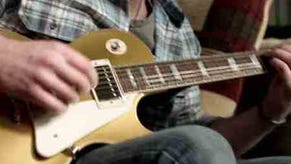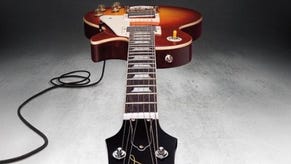Rocksmith review
Uncharted territory.
If the concept of rhythm-game-cum-guitar-tutor Rocksmith has intrigued you, then there's a good chance you fall into the same category of guitarist that I do: a gamer who's fumbled behind the bike sheds of musical ambition in the past and left feeling rather sheepish and incapable, yet still enamoured with the prospect of making more meaningful progress.
Regardless of your experience with the instrument though, and in the wake of the plastic rhythm genre's spectacular fall from grace, Rocksmith has to answer one fundamental question. Is this a game that really teaches you how to play the guitar, or does it teach you how to play a game using a guitar?
This distinction is important, but you won't be able to answer the question immediately. While it's a technically impressive concept, there's nothing plug-and-play about Rocksmith. The lag between your guitar and console is surmountable - just - but only if you accept the stern instructions to avoid using HDMI for video and audio, ideally invest in a home cinema speaker system and some component cables (which are now rarer at retail than hen's teeth), and do so at the same time you just happen to be buying a guitar and a copy of the game from Argos. (Or a bass - support for this instrument has now been added to Rocksmith, an advance over the original North American edition.)
Before successfully shredding a single note, you may also need to spend time tweaking the audiovisual processing software unique to whichever model of television you own. Sliver by sliver, the lag peels away to something that more or less works, and your enthusiastic thumps of the lower E string become more than meek farts that emanate from your speakers a fraction of a second after you've played them.
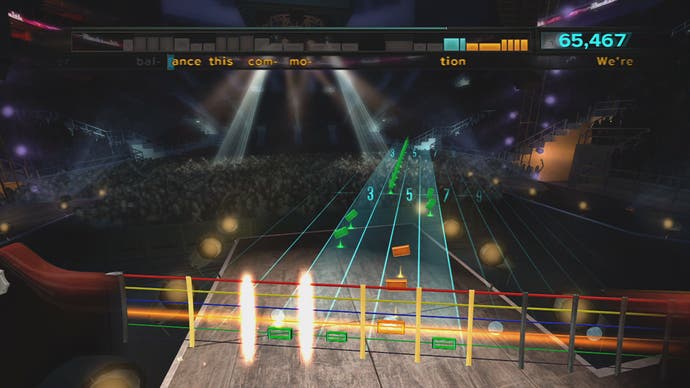
Once calibrated, Rocksmith wastes no time in throwing you into the deep and choppy waters of its career mode, where you'll be roughly led through practice sessions of song collections before performing to a crowd that bobs eerily in front of the stage. The interface is both familiar and frightening, with strings laid out at the bottom of the screen while a series of icons drift towards you. A wide line indicates an open string for example, diagonal lines warn of an upcoming slide, and blocks indicate the fret position of a particular note.
Initially it's both startling and intoxicating to see your real-world picking transformed into a game, but Rocksmith's much-publicised dynamic difficulty system is as hateful in practice as it is laudable on paper - and never more so than in this career mode, where every moment of success is immediately punctuated with an avalanche of sharply escalating complexity. The challenge doesn't so much ebb and flow with your own progress as lift you triumphantly into the sky before crashing you face-first into the ground.
While it's peppered with bursts of delight, the erratic difficulty in career mode makes for a poor teacher indeed, and this entire section of the game would have worked far better as an ultimate challenge to be worked through once you'd started to believe that you'd mastered each song. It could have been something to savour at the end of your journey, something to remind you that practice really does make perfect. Instead, it's an example of Rocksmith feeling slightly embarrassed of its ambitions to teach rather than entertain - and by way of apology it leans inappropriately on the familiarity of Guitar Hero's game structure.
Compounding that over-ambitious career tuition is a grim interface that works against a new player's need to quickly navigate between sections while muscle-memory is keen and fresh. It's a confusing collection of horizontally and vertically-scrolling sub-menus with frequent and lengthy loading. I've been playing Rocksmith for more than three weeks now, and the menu system still has the capacity to make me tremble with rage.
"The challenge doesn't so much ebb and flow with your own progress as lift you triumphantly into the sky before crashing you face-first into the ground."
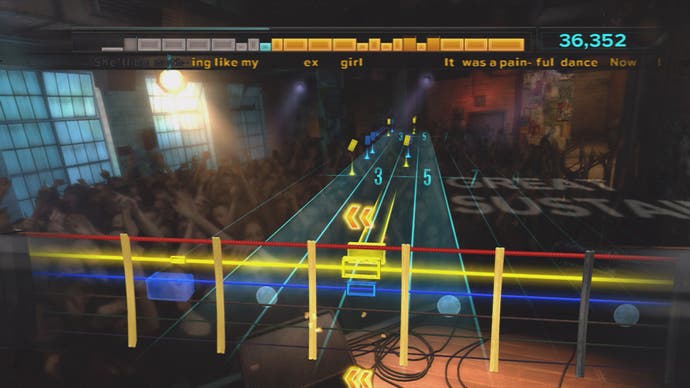
Buried deep within this clumsy interface there is an option to adjust the dynamic difficulty to match your lowest or highest peak, but you'll have to go out of your way to minimise the impact of this flagship feature. In the settings you'll also find an opportunity to invert one of Rocksmith's more exasperating default options. Left to its own devices, the game presents your strings to you as upside down when mirrored against your position facing the television - jarring and unhelpful for players of any experience.
Rocksmith's redemption, both as a game and as a learning tool, is found in the option to tackle individual songs one at a time. Here you can work through personal favourites at a relatively sensible pace, mastering choruses, verses and riffs via an assortment of game modes that gradually ease you deeper into the complexities of each section. The pace is more in keeping with your own skill progression, and it's far more effective to focus on mastering a single tune rather than dipping in and out of multiple tracks for variety's sake. It's a lot like learning to play the guitar, in other words.
Within this mode you'll eventually master each section of a song and feel damn proud of mastering it - just as you should. You will grin with sheer delight when everything comes together - and, left to perform at your own steadily advancing pace, it turns out that you actually can play the opening licks of Are You Gonna Go My Way pretty damn well, thanks very much. But rewarding progress by immediately crushing you with a rapidly approaching convoy of unfamiliar, finger-spraining chords is not encouraging, and outside of this self-paced mode, the game takes a sad and lonely sort of pleasure from breaking your heart.
Like the selection of music - which drifts between genres but never strays too far from the comfortable middle-ground of Dad Rock - the mini-games are a mixed bag. A duck shooting game has you sweeping your fingers across the length of the fretboard, firing musical shots at the ducks from the correct position - a logical way to teach critical finger placement. More tenuous is the baseball game where you bend notes to strike a ball as it arrives from a pitcher. It's a play on words stretched into gameplay for the sake of it, and surely represents the discardable remains of some early-days brainstorming session.
"Over the last few weeks... I've willingly spent more time with a real guitar in my hands, gained tougher callouses on my fingers, and learned to play more songs than I have in the last 20 years of my life."
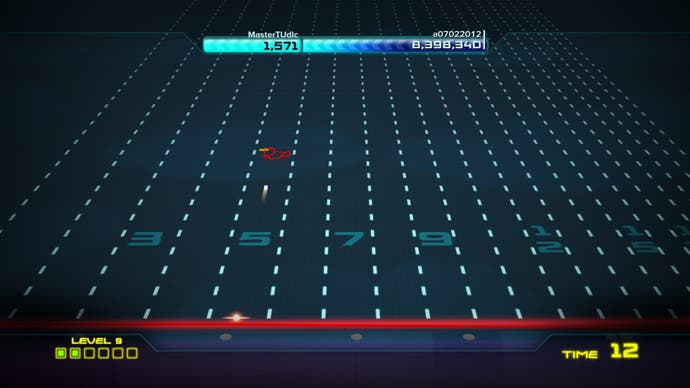
If this all sounds quite damning, consider this. Over the last few weeks I have lost my temper an awful lot with Rocksmith, it has made me crushingly sad on more than one occasion, and yet I still go back for more. I've willingly spent more time with a real guitar in my hands, gained tougher callouses on my fingers, and learned to play more songs than I have in the last 20 years of my life. I can play the intro licks to Are You Gonna Go My Way.
When I plug the guitar back into my amp, lose the game's deliciously generous noise-gating and hear my clumsy fingers make sweeping, creaking fretboard noises that sound like a ghost humping a theremin - well, I still sound awful. But for everything that's awkward or just plain infuriating about Rocksmith, I can't say I haven't made progress, or that the game hasn't achieved some measure of its purpose.
So is Rocksmith a game that teaches you to play the guitar, or does it teach you how to play a game with a guitar? It sits awkwardly somewhere between the two, yet it will still make you feel as though you've achieved something. It will make you feel comfortable holding and playing a real guitar, and empowered to go further in spite of its apparent animosity towards you. The less you treat Rocksmith like a game, the more fun you'll have with it. Any sequel will need the confidence to do the same.





